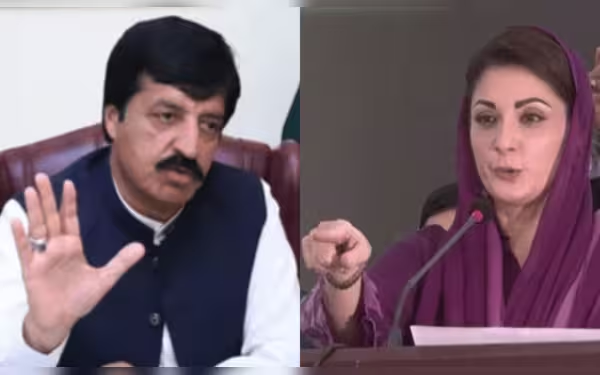Wednesday, January 22, 2025 04:22 PM
Punjab Governor Criticizes Maryam Nawaz's Governance Approach
- Governor Haider criticizes Maryam Nawaz's lack of consultation.
- PPP threatens to withdraw support from PML-N coalition.
- Calls for inclusivity in decision-making among provinces.
 Image Credits: dawn
Image Credits: dawnPunjab Governor Saleem Haider criticizes Maryam Nawaz's governance, highlighting tensions within the PPP-PML-N coalition.
In recent developments within the political landscape of Punjab, tensions between the Pakistan Peoples Party (PPP) and the Pakistan Muslim League-Nawaz (PML-N) have escalated significantly. This discord was prominently highlighted by Punjab Governor Saleem Haider, who expressed his dissatisfaction with the ruling party's approach to governance and decision-making. The governor's remarks come at a time when the coalition between these two parties appears to be on shaky ground, raising questions about the future of their partnership.
During a security workshop in Lahore, Governor Haider did not hold back in his criticism of Chief Minister Maryam Nawaz, stating, "Chief Minister Maryam Nawaz has become an empress. She never calls or consults me on issues of merit." This statement underscores the growing frustration within the PPP regarding their exclusion from key decisions, particularly concerning the appointment of vice-chancellors at universities. The governor's comments reflect a broader sentiment within the PPP that their contributions and support are not being adequately recognized by their coalition partner.
Haider further emphasized the importance of merit in governance, asserting that the PML-N government "will come to its knees" if the PPP were to withdraw its support. This assertion highlights the delicate balance of power within the coalition and the potential consequences of continued neglect of the PPP's role in governance. The governor's frustration is compounded by his attempts to reach out to Chief Minister Nawaz, which he claims have been met with silence. "Over the past six months, I tried to contact her repeatedly by phone, but got zero response as she never consulted on any issue. So now I won’t meet her," he stated, indicating a significant breakdown in communication.
The relationship between the PPP and PML-N has been fraught with challenges, as Governor Haider recalled past experiences of coalition governance that were marked by unfulfilled promises and lack of implementation of agreements. He noted, "Written agreements were reached and advisory committees were formed, but decisions were never implemented." This historical context adds depth to the current tensions, suggesting that the issues at hand are not merely recent grievances but part of a larger pattern of dissatisfaction.
In a related development, Rana Farooq Saeed, the vice president of the PPP in Punjab, announced plans to demand the annulment of the alliance during the upcoming meeting of the party’s central executive committee. He articulated the frustrations of PPP members, stating, "How long will we drag along? Something needs to be done now." This sentiment reflects a growing impatience within the party regarding the lack of progress and cooperation from the PML-N.
Moreover, Saeed criticized the PML-N for proceeding with significant projects, such as the construction of a canal on the River Indus, without consulting other provinces. He argued that such unilateral decisions could lead to negative outcomes and emphasized the need for collaboration among all federating units. The call for inclusivity in decision-making is a crucial point, as it highlights the importance of unity in governance, especially in a diverse country like Pakistan.
As the political landscape continues to evolve, the relationship between the PPP and PML-N remains a focal point of interest. The recent statements from Governor Haider and PPP leaders indicate a critical juncture for the coalition, with potential implications for governance in Punjab. The ongoing dialogue about merit, communication, and collaboration will be essential in determining whether these two parties can find common ground or if the rift will deepen further. Ultimately, the future of this alliance will not only affect the parties involved but also the broader political stability in the region.













